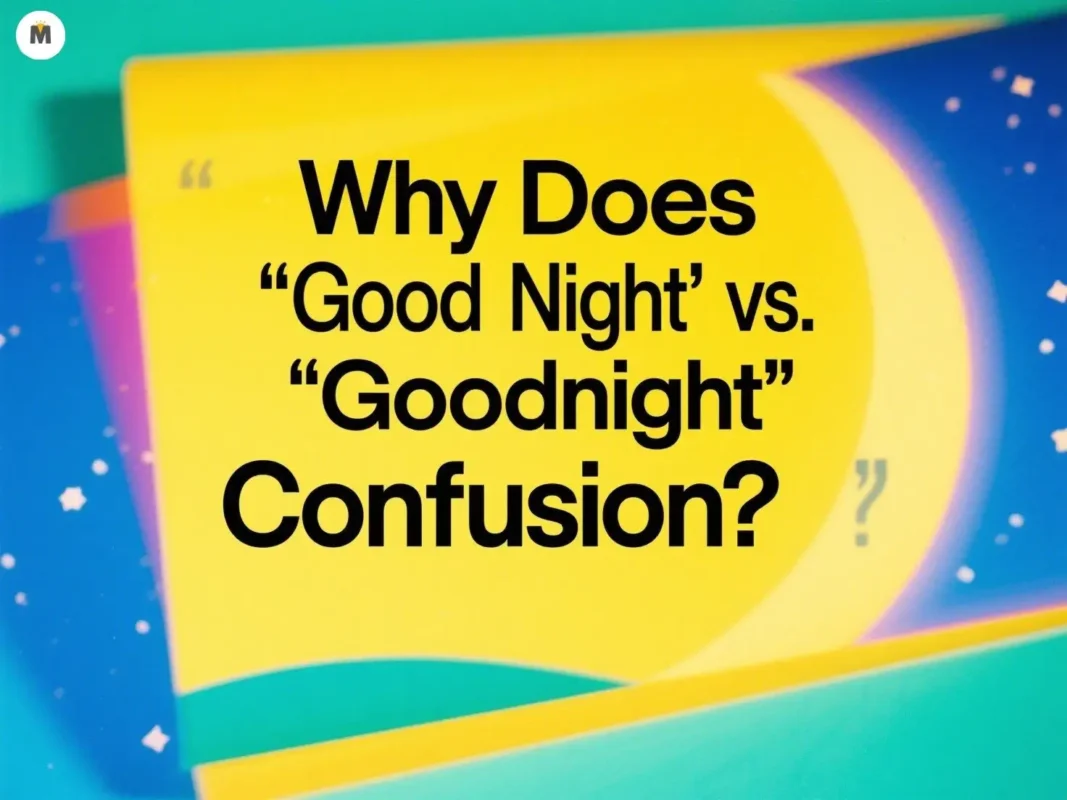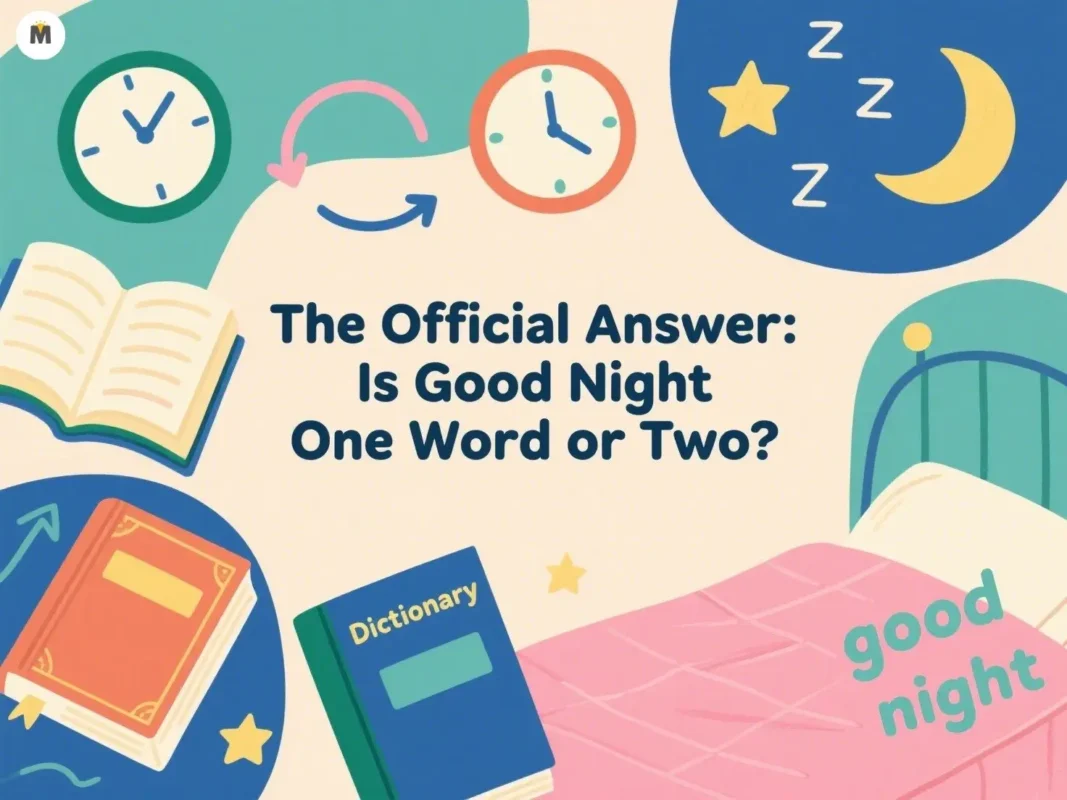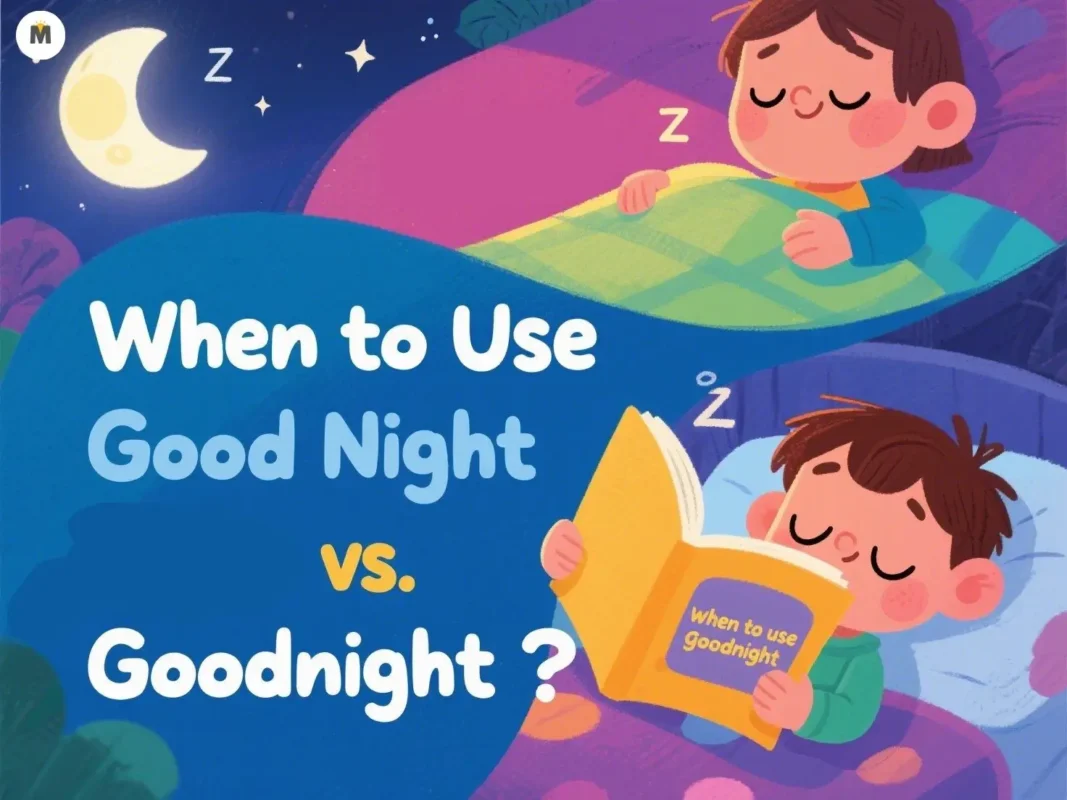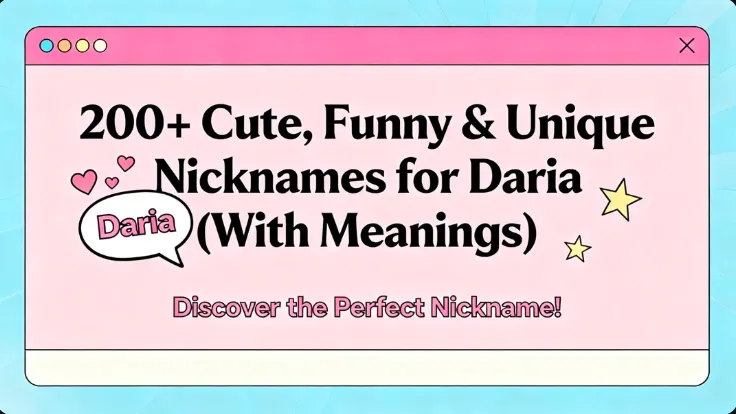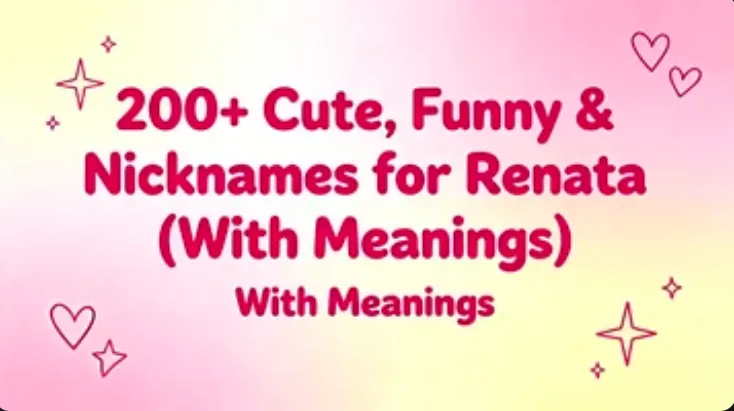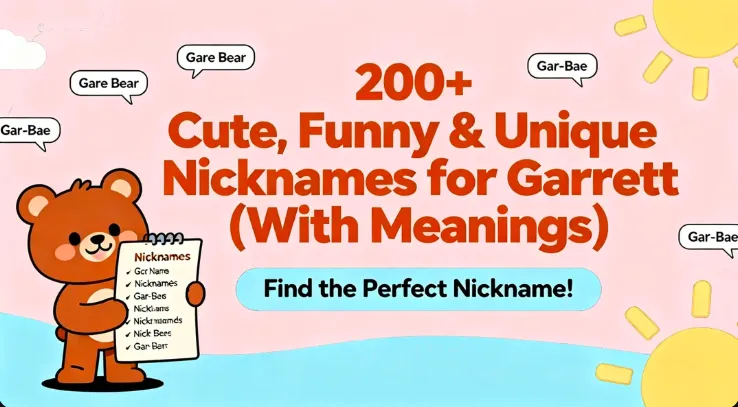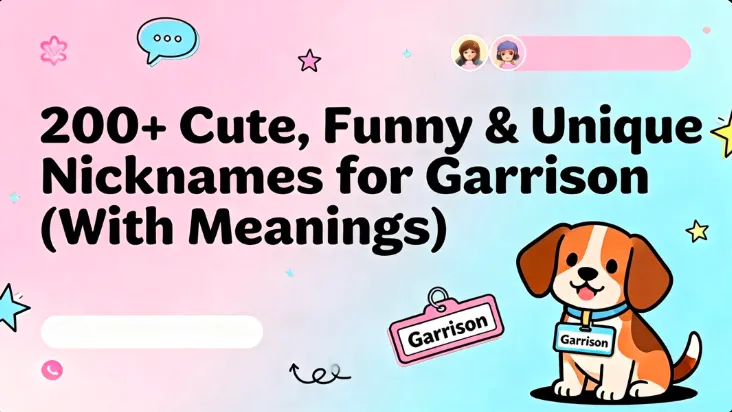Wondering whether to write “good night” or “goodnight”? If you’ve ever paused to ask, “Is good night one word?”, you’re not alone. This common question trips up many writers seeking clarity on good night spelling. The English language is full of nuances, and this phrase is a prime example. In this SEO-optimized guide, we’ll dive into the debate, clarify the correct English grammar usage, and explore how this phrase has evolved. By the end, you’ll know exactly when to use “good night” vs. “goodnight” and why it matters for clear writing tips and communication.
Key Takeaways
- “Good night” is typically two words, but “goodnight” is an accepted single-word variant in specific language usage contexts.
- Dictionaries like Merriam-Webster and Oxford favor “good night” as the standard spelling rules.
- The phrase’s usage depends on whether it’s a farewell, noun, or adjective in English writing.
- Regional differences, such as American vs. British English, influence good night vs. goodnight preferences.
- Understanding compound word rules helps ensure accurate writing for blogs, emails, or casual texts.
Why Does “Good Night” vs. “Goodnight” Cause Confusion?
The question “Is good night one word or two?” sparks confusion due to its frequent use and varying forms. Writers often hesitate, unsure if they’re following proper English grammar rules. Let’s break down why this phrase puzzles so many and how to navigate its spelling guide.
Common Misconceptions About Good Night Spelling
Many assume “goodnight” is always a single word, similar to “goodbye.” Others believe “good night” must always be two words, like “good morning.” The truth lies in context and grammar rules. Here’s what you need to know:
- Farewell Expression: “Good night” is often used as a nighttime farewell to say goodbye at the end of the day.
- Compound Word Variations: English compound words can be open (two words), closed (one word), or hyphenated, leading to spelling debates.
- Casual vs. Formal Use: Informal settings like texts often favor “goodnight,” while formal writing sticks to “good night” for proper English.
Why This Phrase Is Tricky
The English language’s complexity, with its evolving grammar nuances and regional variations, makes “good night” a challenging case. Historical shifts in spelling and the influence of style guides (e.g., AP Style, Chicago Manual) further complicate things. Understanding these factors ensures you choose the right spelling for your audience, whether you’re writing a blog post or a professional email.
The Official Answer: Is Good Night One Word or Two?
To settle the debate on “Is good night one word?”, let’s turn to trusted sources and grammar rules for clarity.
What Do Major Dictionaries Say?
Leading dictionaries provide insight into the correct good night spelling:
- Merriam-Webster: Lists “good night” as the primary spelling, with “goodnight” as a less common variant in dictionary definitions.
- Oxford English Dictionary: Prefers “good night” for formal use but acknowledges “goodnight” in informal language contexts.
- Cambridge Dictionary: Notes “good night” as standard, with “goodnight” appearing in casual writing styles.
These sources confirm that “good night” (two words) is the default, especially in formal English writing.
Grammar Rules for Compound Words
English compound words fall into three categories:
- Open Compounds: Two words, like “ice cream” or “good night.”
- Closed Compounds: One word, like “notebook” or “goodnight.”
- Hyphenated Compounds: Joined by a hyphen, like “well-known.”
“Good night” is typically an open compound, similar to “good morning” or “good evening.” However, “goodnight” is a closed compound in specific informal uses, such as a standalone nighttime farewell.
Historical Evolution of Good Night
The phrase “good night” traces back to Old English, where “good” conveyed a positive wish and “night” referred to the time of day. Over centuries, its spelling stabilized as two words in formal English language history, though “goodnight” emerged as a casual variant in modern language evolution. This reflects broader trends in English, where compound words often shift from open to closed forms over time (e.g., “to-day” became “today”).
When to Use “Good Night” vs. “Goodnight”
Choosing between “good night” and “goodnight” depends on context, formality, and grammatical function. To answer “Is good night one word?” in different scenarios, here’s a detailed spelling guide with a table for quick reference.
Usage Comparison Table
The following table summarizes when to use “good night” vs. “goodnight” to clarify good night spelling:
| Context | Spelling | Formality | Example | Notes |
|---|---|---|---|---|
| Farewell Expression | Good night | Formal | “Wishing you a good night.” | Preferred in professional or formal writing. |
| Farewell Expression | Goodnight | Informal | “Goodnight, see you tomorrow!” | Common in texts or casual social media posts. |
| Noun | Good night | Formal/Neutral | “A good night is essential for rest.” | Used when referring to the concept of a night. |
| Adjective | Goodnight | Informal | “She read a goodnight story.” | Rare, used in phrases like “goodnight kiss.” |
| American English | Goodnight | Informal | “Goodnight, everyone!” | More common in casual U.S. settings. |
| British English | Good night | Formal/Informal | “Have a good night, dear.” | Standard across contexts in UK English. |
As a Farewell Expression
When used to bid someone a nighttime farewell, both forms are acceptable, but context matters:
- Formal Writing: Use “good night” in professional emails, letters, or literature. Example: “Wishing you a good night and a restful sleep.”
- Informal Writing: “Goodnight” is common in texts, social media posts, or casual notes. Example: “Goodnight, see you tomorrow!”
- Quick Tip: If you’re unsure, default to “good night” for clarity and correctness in proper English.
As a Noun or Adjective
The phrase’s grammatical role influences its spelling:
- As a Noun: Use “good night” (two words) when referring to the concept of a night’s rest. Example: “A good night is essential for productivity.”
- As an Adjective: “Goodnight” (one word) is occasionally used in phrases like “goodnight kiss” or “goodnight story.” Example: “She read a goodnight story to the kids.”
Regional Differences in Usage
Spelling preferences vary by region:
- American English: “Goodnight” is more common in casual settings, like text messages or social media language.
- British English: “Good night” is preferred across both formal and informal contexts for consistency.
- Global English: In non-native English-speaking regions, “good night” is often taught as the standard form in English learning settings.
By tailoring your spelling to your audience’s expectations, you can enhance clarity and engagement in your content writing.
Practical Tips for Using Good Night Correctly
To ensure you’re using the phrase accurately and answering “Is good night one word?” correctly, follow these writing tips:
- Check Your Context: Use “good night” for formal writing or when the phrase functions as a noun. Opt for “goodnight” in casual, standalone nighttime farewells.
- Consult Style Guides: If writing for a publication, follow its preferred style (e.g., AP Style recommends “good night”).
- Consider Your Audience: For international or professional audiences, stick to “good night” to avoid confusion.
- Proofread for Consistency: Ensure you use the same spelling throughout your document or conversation to maintain writing clarity.
Why Correct Spelling Matters for SEO and Readability
Using the correct spelling of “good night” or “goodnight” isn’t just about grammar—it impacts your content’s performance:
- SEO Benefits: Search engines prioritize clear, consistent language. Using “good night” aligns with common search queries like “Is good night one word?”, boosting discoverability and potential featured snippets.
- User Experience: Accurate spelling enhances readability, making your content more professional and trustworthy.
- Engagement: Clear communication, aided by tools like tables, keeps readers on your page longer, improving dwell time and SEO rankings.
Conclusion: Master Good Night with Confidence
Whether you’re saying a nighttime farewell, writing a blog post, or crafting a story, knowing the answer to “Is good night one word?” ensures your writing shines. Stick to “good night” for formal contexts and noun usage, and reserve “goodnight” for casual farewells or adjective phrases. By understanding the grammar rules, history, and regional nuances, you’ll communicate clearly and optimize your content for both readers and search engines.
Frequently Asked Questions (FAQs)
Is good night one word or two?
The most common spelling is “good night” (two words), as per major dictionaries like Merriam-Webster and Oxford. “Goodnight” is an accepted 1 word variant in informal language contexts.
When should I use “goodnight” instead of “good night”?
Use “goodnight” for casual nighttime farewells (e.g., “Goodnight, friends!”) or as an adjective (e.g., “goodnight kiss”). Use “good night” in formal writing or as a noun (e.g., “I had a good night”).
Is “goodnight” a compound word?
Yes, “goodnight” word is a more closed compound word, combine together “good” & “night.” In contrast, “good night” is an open word compound.
Do dictionaries recognize “goodnight” as a single word?
Yes, dictionaries like Merriam-Webster and Cambridge list “goodnight” as a variant, though “good night” is the preferred standard in dictionary definitions.
Are there regional differences between “good night” and “goodnight”?
American English often uses “goodnight” in casual settings, like social media posts, while British English prefers “good night” across contexts. Global English typically favors “good night” in English learning settings.
Is “goodnight” ever hyphenated?
No, “goodnight” is never hyphenated. It is either “good night” (2 words) or “goodnight” (1 word).
How has the phrase “good night” evolved historically?
Originating in Old English, “good night” combined “good” (a positive wish) and “night” (time of day). The two-word form remains standard in English language history, with “goodnight” emerging as a modern, informal variant.

